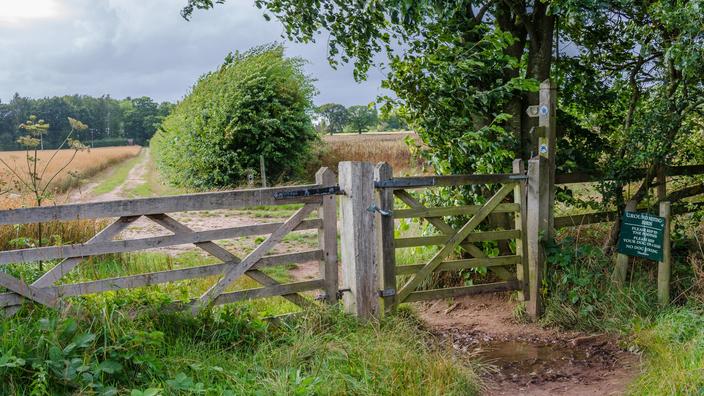The fact that a neighbor has to go through another owner's garden to reach their property is more common than you might think, but the rules surrounding a
right of way
can seem a bit hazy, when one is faced with it.
To discover
Garden: what to plant, sow or harvest in November?
November: what are the seasonal vegetables and fruits?
What is a right of way?
We talk about a right or a right of way when an owner of an enclosed land has no other choice but to enter and pass through the property of another person to join the public highway. .
The owner concerned by this lack of access to the public highway can then invoke the right to open up his property, thus inducing a right of way on the property of his neighbor.
In this specific case, the easement is therefore imposed on the neighbor who must authorize the passage and who receives in return a financial compensation.
This
right to access
can also be invoked if the planned access is insufficient for the passage of a vehicle and can apply to agricultural land.
Read alsoHedge: size, maintenance, regulations
Landlocked and difficult to access land: two different cases
A distinction should be made between land that is landlocked and land that is difficult to access.
If the first opens the right to access, this is not the case for the second.
A landlocked land, as seen previously, automatically and legally gives a right of way on the neighboring land.
If the land is simply difficult to access, it is necessary to obtain the consent of the owner of the garden or neighboring land to obtain a right of way.
Note, it is also possible to establish an amicable right of way between two neighbors.
If both agree, they are free to establish the terms of this right of way.
Read also What are the height and distance rules for a fence wall?
How to establish a right of way?
If the right of way concerns a landlocked land, then the right of way is acquired, however, it is advisable to contact a notary in order to establish a notarial deed signed between the two neighbors in order to rule on several parameters of this right of way, such as the route of the access road on the property, but also the compensation paid by the owner of the landlocked land to his neighbor.
This must be proportionate to the damage or nuisance suffered by the passage (noise in particular).
If the right of way concerns land that is difficult to access, a written agreement must be established between the two owners and must also specify:
The route of the authorized path
The terms of use (right of pedestrian passage, authorized vehicle, etc.)
The amount of compensation that the owner of the difficult-to-access land will pay to the owner who opens the right of way on his land.
This is freely fixed and must be proportional to the inconvenience and damage caused by this passage.
The terms of an amicable right of way are the same as for difficult to access land.
Read also Bad odors, stagnant water: what remedies in the event of odor nuisance?
How to cancel a right of way?
In the case of an enclosed land, the right of way ceases as soon as work has been carried out (creation of a road or a path) allowing the land to be connected to a public thoroughfare.
It will then be necessary to establish an act of cessation of servitude with a notary.
In the case of difficult to access land or an amicable agreement, the agreement of the two owners will be required to terminate the right of way.
Likewise, it will take mutual agreement to modify the terms.
Read alsoNeighbourhood: is brush clearing compulsory?
What to do in case of litigation ?
In all cases (landlocked, difficult to access or amicable agreement), it is possible in the event of a conflict to initiate an appeal after a court.
This neighborhood conflict may concern the modalities of execution or the termination of the right of way if no amicable agreement is reached by the two owners.
The judge hearing the case will then be able to determine the location of the crossing, its exercise (pedestrian or vehicle for example), as well as the amount of compensation to be paid to the owner who suffers the crossing.
Please note, in the event of a dispute concerning the amount of compensation, it is up to the serving owner, that is to say the owner who grants the right to his land, to prove proof of the damage caused by the passage.
If the right is not used for 30 years then it is revoked.
The court can be called upon to lift the right of way.
To prove the non-use of the right of way, several means can be presented to the judge, such as testimonies, photos of the abandoned land, or a bailiff's report.







/cloudfront-eu-central-1.images.arcpublishing.com/prisa/QZMQT76QCNGNPKZVBFINPBNJA4.jpg)







